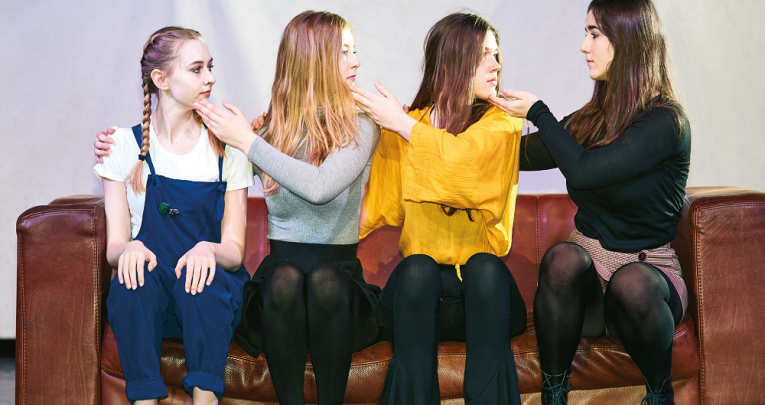Schools Need to Ensure Students from Disadvantaged Backgrounds can Access Theatre

A disproportionate number of people from disadvantaged backgrounds work in theatre – and schools are partly to blame, says Katie Masters…
Something is rotten in the state of British theatre – and the decay is starting in schools. That was the uncompromising finding from the Labour Party’s recent inquiry into inequality in the arts industry: the evidence being the dwindling numbers of people from disadvantaged backgrounds who are working in the theatre.
The figures are hard to argue with. While 33% of the British population has a working-class background, only 16% of British actors are working-class. In contrast, while only 29% of the British population has a ‘privileged’ background, they comprise 51% of today’s actors. This matters, says the report, on both a societal and a financial level. If sectors of the population are under-represented, it’s harder for their voices to be heard or their stories told. That heightens social estrangement.
It also means the industry is missing out on talent that would fuel growth and revenue.
And while the reasons for that underrepresentation are multi-faceted, voices from across the industry and from within education, are saying – emphatically – that changes to the curriculum and lack of funding is squeezing drama out at a crucial entry point: secondary school.
Time and value
Laura Hennessy has been teaching drama for 13 years: both at large, mixed comprehensive schools and at selective grammars.
“The introduction of the English Baccalaureate, which prioritises academic subjects – and does not feature drama as a subject through which school attainment can be measured – is contributing to a decline in arts subjects,” she argues.
“It’s a decline that can be seen in the attitude expressed towards the subjects by students, parents and schools. Drama isn’t seen as valuable because it doesn’t count towards the school’s progress – as measured in terms of the political criteria for success.”
Bethan Evans, who has taught drama for 15 years, highlights another issue caused by the focus on purely academic subjects. “Drama needs time invested in it,” she points out.
“I used to be able to take students to the theatre in the evening or rehearse productions after school, but these days, if a student is falling behind in a core subject, it’s compulsory for them to stay behind for an after-school homework club. I understand that, but it means there’s less room for other opportunities.”
In this analysis, the perfect storm facing drama is made up of a decline in appreciation for what the subject offers and a lack of time and resources dedicated to it. This affects all students, but it’s arguable that students from less privileged backgrounds are likely to be hardest hit.
“For a lot of these students, school is their only access to the theatre,”says Laura. But cuts and curriculum change are a reality. So, what can secondary schools do to stem the growing inequality in the theatre?
Potential solutions
Make students and parents aware of the skills that drama teaches “Drama teaches leadership; confidence; empathy and invention,” says Paul Roseby, chief executive and artistic director of the National Youth Theatre.
“It teaches you to be responsive – acting isn’t formulaic, you act on instinct. That stimulates creativity and the ability to respond in an agile way to the ideas and experiences you encounter.”
Make students and parents aware of the career opportunities within the theatre “The World Economic Forum says that by 2020 the top five skills that will be needed in the workplace are complex problem solving; critical thinking; creativity; people management and coordinating with others,” says Romana Flello, manager of the Young Court – The Royal Court Theatre’s programme for young people up to the age of 25.
“Those are all skills that you can learn in school, doing drama. Students and parents should be told that. It’s also important that students should be given clear careers guidance so that they understand a career in the theatre isn’t just about writing or acting: there are roles in finance; marketing; stage design; prop building and so on.”
Introduce contemporary voices “The texts being studied in the classroom tend to have been written by old, white men,” says Romana. “They don’t speak to today’s teenagers, so why would theatre seem relevant to them and to their lives? Students should be reading broader texts, by contemporary playwrights. People like Debbie Tucker Green; Roy Williams; Charlene James.”
“It’s also important to go and see productions that students can relate to,” adds Bethan.
“I took a group of students to see a production by The Paper Birds theatre company. It was set in a caravan and it was exploring social mobility. The students loved it. One turned to me and said, ‘I could write a play, couldn’t I? My life is worse than this sometimes. I could put it all down.’ That experience made drama immediate, relevant and transformative, which is what it should be.”
Get students into theatres “The theatre needs to be a place where you feel there’s a place for you; that you’re allowed to be there.” says Romana. And for students to feel that, they need to visit theatres and understand how they work.
“Think outside the box,” advises Bethan. “I spoke to our local theatre about bringing in the Y8s. They didn’t have a production that was right for that group but instead they offered – for free – a bespoke, afternoon, backstage tour.
“It brought the children into the theatre, so it demystified the space. And it taught them the breadth of what goes on in a theatre: the backstage roles as well as the on-stage activities. There’s sometimes funding in the arts for things like this if you have the time to make those connections and build those relationships.”
Use drama to enrich core subjects “I’d like to see drama teachers being recognized as core members of staff, in the same way as sports teachers,” says Paul.
“Make a trained drama teacher the school’s artistic director and ask them to spend their time creating cross-curricula performance pieces that are informed by all the different subjects.
“As an example: dramatise the story of Alan Turing, which touches on history; IT; human rights. Use drama to draw students in, and show them how it can be used to broaden their understanding of a subject and to communicate the excitement of that story to other people.”
Explore Arts Award run by Trinity College London “Arts Award is like a Duke of Edinburgh scheme for the arts,” says Laura.
“It has five levels, four of which are on the Regulated Qualifications Framework. Gold Arts Award, which is open to young people up to 25, has 16 points on the UCAS tariff. To achieve it, students collect a portfolio of evidence of their experience in developing their own arts practice and showing leadership of an arts project.”
Find out more at www.artsaward.org.uk. Browse Children in Need activities.










